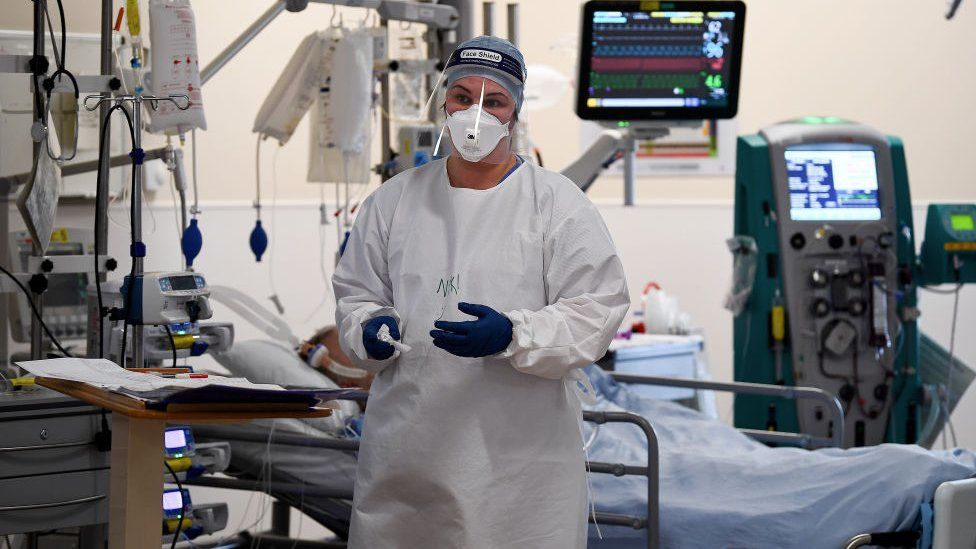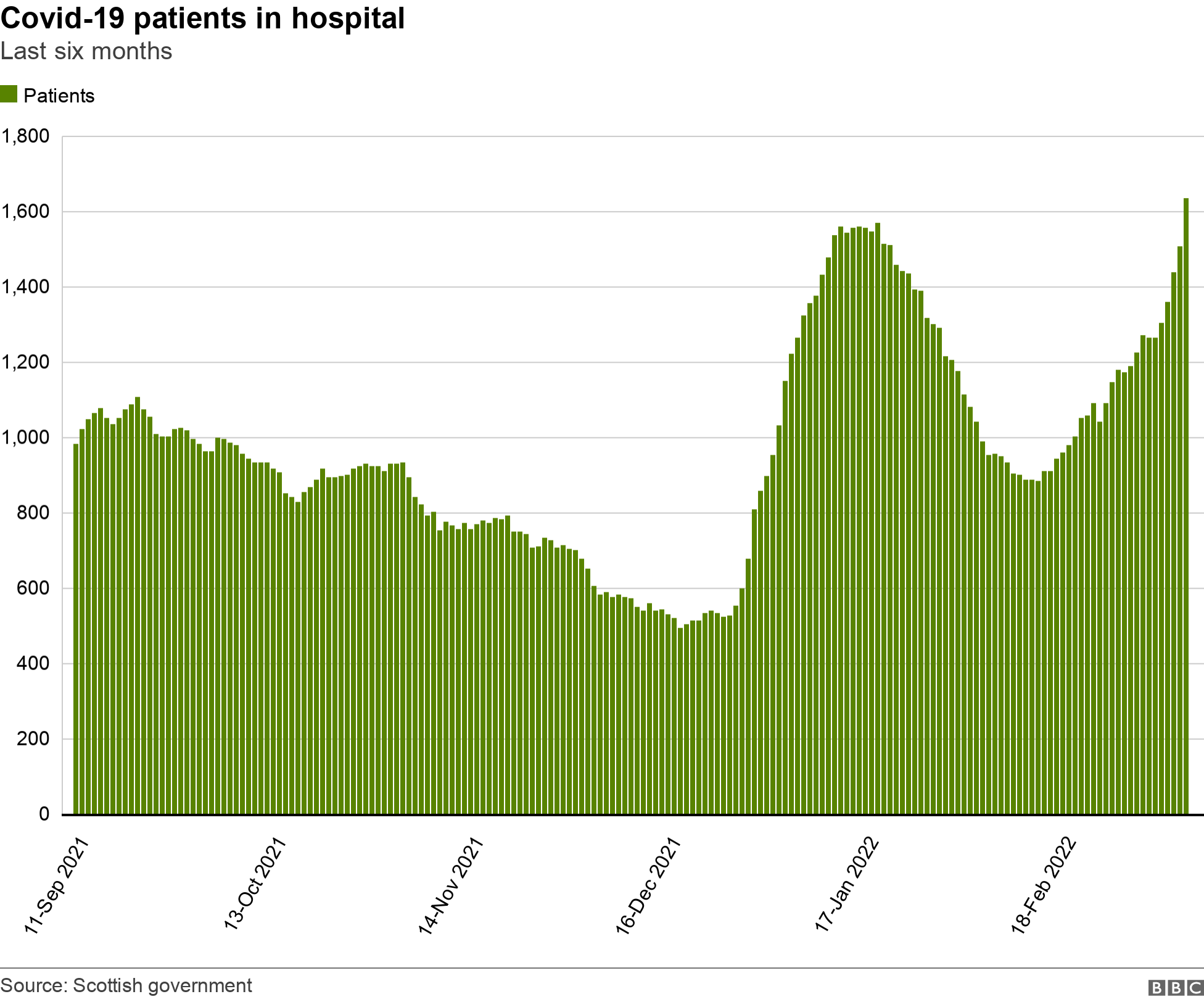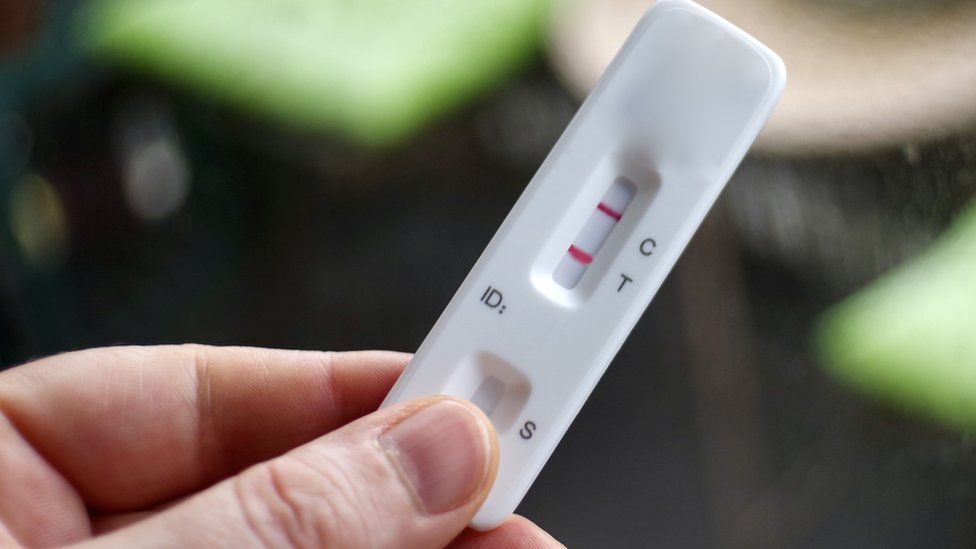Covid in Scotland: Virus infection levels hit new record high
 Image source, Getty Images
Image source, Getty ImagesAlmost 300,000 people in Scotland had Covid last week, according to Office for National Statistics estimates.
It is the highest figure since sampling began in autumn 2020 and suggests about one in 18 people had the virus.
Estimated infection levels have now risen for six consecutive weeks and the number of people in hospital with a positive test is at a 13-month high.
However, experts say that due to vaccinations and treatments, numbers in intensive care are very low.
All remaining legal restrictions, including the wearing of masks, are due to be lifted in Scotland on 21 March.
Health Secretary Humza Yousaf told the BBC that cabinet would discuss on Tuesday whether that could go ahead given the current threat levels.
He said: "Clearly we have in some respects to learn to live with Covid and our updated framework does that but you've also got the fact around the harm that it causes people, particularly those who are vulnerable."
National clinical director Prof Jason Leitch said the latest numbers were "big" and people shouldn't "drop your guard" but he said there was also more encouraging news on mortality rates.
Speaking the BBC's Drivetime with Fiona Stalker: "The number of infections that causes single death has been radically transformed, by Omicron helping us but also by vaccination helping
"So it's considerably lower risk overall - but the big numbers still make that risky for individuals."
The ONS weekly infection survey is considered the most reliable measure of the prevalence of coronavirus in the UK.
The survey uses a representative sample of swab tests collected regularly from thousands of households to estimate the percentage of people likely to test positive for Covid-19 at any one point in time, regardless of whether they have symptoms.
Hospitals beyond full capacity
Rising case levels have been putting pressure on hospitals, with a steady increase in the number of patients with positive tests since mid February.
NHS Lanarkshire has appealed for the public to consider alternatives to A&E as its three acute hospitals are working beyond full capacity.

Deputy director of acute services Russell Coulthard said: "Unfortunately many patients in our emergency department will be waiting over 10 hours to be admitted due to the current overwhelming demand which is well in excess of our target of four hours."
He added there were 194 Covid patients across the three sites on Friday compared to 66 in the middle of last month.
Omicron subvariant
Scotland's chief medical officer Prof Sir Gregor Smith said the current rise in cases in Scotland was partly being driven by the new Omicron subvariant, known as BA.2
In a series of posts on Twitter he said the rate of increase was greater in younger and older age groups.
While hospital occupancy due to Covid cases was increasing, ICU admissions remain very low and stable. "At this point, this is very encouraging and there is no signal on excess deaths data," he added.
Prof Smith said hospital occupancy was increasing particularly for the over-60 age groups.
Infection expert Dr Christine Tait-Burkard told BBC Radio Scotland's Lunchtime Live programme that Covid in Scotland was moving from the pandemic to the endemic stage.
She said: "The decrease in mortality tells us we have done a fantastic job at making this virus less severe with vaccinations, with drugs, with treatments and, also, the virus itself has luckily changed.
"So we are just transitioning through that stage now and it's unlikely that we are going to see a level of restrictions, if any, reintroduced especially throughout the summer months when the pressure from other disease is much less."
 Image source, Getty Images
Image source, Getty ImagesDr Tait-Burkard, who is based at the University of Edinburgh's Roslin Institute, said the current rise could also be linked to the easing of virus guidelines.
She said the move towards the summer months would see people spend more time outdoors and should alleviate pressures on the NHS.
Rising across the UK
It is now two years since the World Health Organization declared a global pandemic, 10 days after the first Covid case was confirmed in Scotland.
The latest ONS data shows infections have risen in all four nations of the UK, the first time since the end of January that all nations have seen a simultaneous week-on-week increase.
Northern Ireland has the highest rate (one in 13 of the population) followed by Scotland (one in 18), England (one in 25) and Wales (one in 30).
In Scotland, that means an estimated 299,900 people had Covid in the week ending 6 March, the highest figure since estimates began in autumn 2020. The previous record was 297,400 in the first week of this year.
Latest daily figures reveal Scotland has recorded 22 coronavirus-linked deaths and 13,220 new cases in the last 24 hours.
While total numbers of people in hospital are high and still rising, only 33 people with Covid are currently requiring intensive care. Ten of those have been in ICU for longer than 28 days.



No comments